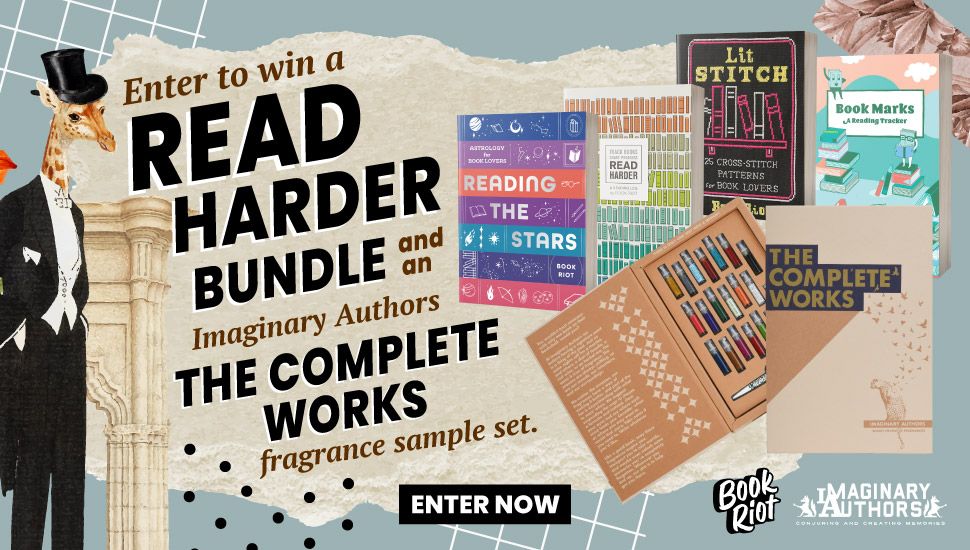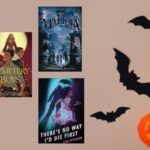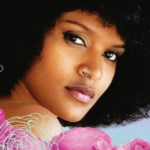Transcript: Alisha Rai and John Scalzi
This is a transcript for Recommended Episode 12.
This episode of Recommended is sponsored by Renegades by Marissa Meyer.
Marissa Meyer, #1 New York Times-bestselling author of The Lunar Chronicles, takes on the classic battle between good and evil and manages to make it completely fresh and unpredictable. Meyer has channeled her love for superheroes into a high-stakes world of adventure, passion, danger, and betrayal.
More about Renegades by Marissa Meyer later in the show.
JENN: This is Recommended, where we talk to interesting people about their favorite books. This week we’re joined by John Scalzi, who picked The People’s Almanac by David Wallechinsky, Amy Wallace, and Irving Wallace.
SCALZI: The fun thing about The People’s Almanac was the concept of it really was not only the stuff that everybody else knows, but kind of the interesting stuff about the stuff everybody else knows but they might not know this one particular thing.
JENN: And Alisha Rai, discussing A Distant Heart by Sonali Dev:
RAI: It’s not like any of her other books. Her voice is the same of course, so if you like her voice, you’re going to like it. Also, it’s so refreshing, new, and innovative. It’s good.
JENN: John Scalzi is a New York Times bestselling author of science fiction. He won the 2006 John W. Campbell Award for Best New Writer, the 2013 Hugo Award for Best Novel for Redshirts, and his debut novel Old Man’s War was a finalist for the Hugo Award . His latest novel, Collapsing Empire, is the start of a new series of space operas in which an extra-dimensional field called The Flow has allowed humans to spread across the universe. But The Flow is shifting, and humanity is now in a race against time to discover what, if anything, can be salvaged from an interstellar empire on the brink of collapse.
SCALZI: My name is John Scalzi, and The People’s Almanac, by David Wallechinsky and Amy Wallace is my recommended.
I first found the book at my grandmother’s house in Escondido, California. We were down visiting her for Christmas, and I would have been about six or seven years old at the time. I remember looking at her sofa table, and there was this big, thick monster book that said The People’s Almanac on it, and I had no idea what an almanac was supposed to be, and I asked her what that was, and she said it was just a book full of information. I was like, “Well, I like books. I like information.”
So, I opened it up and it seemed to me that this book had all of the information in the world, because it was over 1,000 pages, if I remember correctly, and every page was something new and something interesting. It was arranged in various chapters, so the first one was kind of just general information. Another chapter was all specifically about science, another one was about sports, another one was about entertainment, and my favorite chapter was the spooky stuff about paranormal stuff, and it had stories about devils that hooves were seen walking around in Amsterdam back in the 1640s. Just all this sort of stuff. And so the entire time that we were there for that Christmas holiday, I was basically on the sofa, reading this book. That was all I did with my Christmas time.
I think my grandmother must have had the same sort of inclinations that I do. I think it might be genetic, the desire just to know a whole bunch of stuff about a whole bunch of stuff. One of the things that I like telling people about my knowledge base is that with very few exceptions, which are related to mostly my professional stuff, I have a very wide, but not that deep knowledge of just about everything. So, if I’m having a conversation with people that I’ve just met, there’s a really good chance that I can have a conversation about any topic, as long as it doesn’t go more than two or three questions down, right. After that point, I just let them lead the conversation. Well, what do you think about the game that just happened last night? Well, this is what I think, blah, blah, blah, blah, and just let them go off, and then I get a reputation for being very intelligent because I know when to shut up and listen.
This is something that my mother likes, something that I like. It’s something I think my grandmother likes, and certainly my kid is the same way, is just learning stuff about stuff just seems really cool. So, it’s not too surprising that she had that particular book in her house. I think she was a little surprised at how rapidly and how avidly I took to it, simply because I was, like I said, six or seven at the time. It’s not designed for six- or seven-year-olds, but I was one of those , precocious children. So, it suited me very well.
It was so clear that I really liked that particular book that when my birthday came around in May, guess what I asked for and guess what I got? I got The People’s Almanac. Now we fast forward a couple more years, I’m about 10 years old, and I do this thing where I run out into the middle of the street and get hit by a car. When I get hit by a car, immediately this puts a damper on all the outdoor plans that I might have been having for the next several months, and I was really depressed about the fact that I had a broken leg, not just because it was a broken leg, but because the things I was allowed to do were cut down quite a lot. So, there I am, on the sofa, being mopey and sad while everybody’s having fun without me. My mother comes in and goes, “I know that you’ve been mopey and sad, so maybe this will help.” And she presents me with this big, thick book that is The People’s Almanac #2. Because now I had The People’s Almanac #2, I was happy to be inside for months at a time.
All of that stuff, again, just a huge sweep of interesting stuff kind of ignited a lifelong love of general information and trivia. One of the things I like to say whenever I meet librarians is that my favorite Dewey Decimal System number is 031, and they all go, “Oh, that makes perfect sense about you.” 031 is literally the number that’s given to trivia.
The People’s Almanac definitely had an influence on my writing, first as a kid, just the idea of here was a touchstone that I had information from, and so whenever I started writing about a particular topic, other people might have gone through the Encyclopedia Britannica first or the World Book or whatever. I went to The People’s Almanac first and then kind of branched off from there. So, it was kind of my touchstone. The funny thing about The People’s Almanac was the concept of it really was not only the stuff that everybody else knows, but kind of the interesting stuff about the stuff everybody else knows but they might not know this one particular thing.
So, when I was writing reports when I was in middle school and high school and stuff like that, I always knew just a little bit different information about a lot of things and a lot of people, and so that took me down a lot of different avenues of inquiry.
Before I became a novelist, I was doing a lot of freelance work, and I was particularly with people like the Uncle John’s Readers. The Bathroom Readers had the articles full of interesting trivia that you can read in quote on quote ” one sitting.” I wrote a lot of those, and so one could say that my interest and love and appreciation for The People’s Almanac kind of germinated in me being a writer of articles that were short, sweet, to the point, had really interesting kind of almost trivial bits about a whole, broad topic of things. So, I became, in many ways, the sort of writer who would have written something like The People’s Almanac.
I did recommend The People’s Almanac from The Books of Lists when I was a kid to other kids who were nerds like me, and as I got older, I saw other books that were very similar to that.
One of my favorite versions of that in college, and which has gone through several revisions and may still be out there, is a book that was called An Incomplete Education, which basically had the same format, of here’s all this interesting stuff about a bunch of random stuff. This is stuff you can use in conversation to make it look like you actually know what you’re talking about so long as no one really quizzes you on it. I’m like, “That’s exactly what I need.” So, that was another book that was along the lines, and then, of course, the Uncle John’s Reader series, which, like I said, I was a contributor for a very long time, and it’s a very … It’s a book series with a very humble intent. You’re going to be in the bathroom for five to seven minutes. You might as well have something to read, right? But at the same time, they are written to be interesting and to be … Like, you’re sitting there going, “Oh, I did not know that,” and you come out of the bathroom slightly smarter than you came in.
So, these are the types of books that are like The People’s Almanac that still do exist. They’re definitely ones that I do recommend to people because it’s never a bad thing to know more than you do now, and it’s never a bad thing to learn more and to be able to incorporate that knowledge in one way or another. God knows that we live in an era where disinformation is so rife and rampant, and people are actively trying to promote and promulgate this information, that anything that actually comes into your brain that is this is true, this is an actual thing, and it’s written in an interesting and accessible style, is something that I think is a benefit not only to that particular person, but overall to our culture in general.
JENN: Thanks again to John Scalzi for joining us and recommending The People’s Almanac by David Wallechinsky, Amy Wallace, and Irving Wallace. His novel The Collapsing Empire, published by Tor Books, is available wherever books are sold. You can follow him on Twitter at scalzi.
Fierce Reads is the exclusive sponsor of this season of Recommended, and they are hosting a huge giveaway for Recommended listeners, so go to FierceReadsRecommended.com to enter for a chance to win a bunch of great books.
Included in that giveaway is Renegades by Marissa Meyer.
The Renegades are a syndicate of prodigies—humans with extraordinary abilities—who emerged from the ruins of a crumbled society and established peace and order where chaos reigned. As champions of justice, they remain a symbol of hope and courage to everyone…except the villains they once overthrew.
Nova has a reason to hate the Renegades, and she is on a mission for vengeance. As she gets closer to her target, she meets Adrian, a Renegade boy who believes in justice—and in Nova. But Nova’s allegiance is to a villain who has the power to end them both.
Renegades is part one of what’s sure to be an epic duology! Part two to come in Fall 2018.
Our thanks to Renegades and Marissa Meyer for making Recommended possible.
JENN: Alisha Rai is the first author to have an indie-published book appear on Washington Post’s annual Best Books list. Her books have also won the RT Reviewers Choice Award and have received critical attention and rave reviews from sources such as Library Journal, USA Today, BookRiot, Washington Post, Bitter Empire, NPR, and Smart Bitches Trashy Books. Her newest series, Forbidden Hearts, started this year with Hate To Want You. A steamy and emotionally complex romance, it follows Livvy Kane and Nicholas Chandler, separated by their feuding families, as they find out if love can overcome the scandal that divided them.
RAI: My name is Alisha Rai. A Distant Heart by Sonali Dev is my recommended.
The book is coming out 12-26 of this year, so like a little after Christmas present I guess for everyone. It’s kind of complicated. It’s almost like a Rapunzelish story a little bit.
She’s sort of kept away from everybody, because she’s ill. She makes this unlikely friend. She’s very wealthy. Her family’s very wealthy in India. She makes this friend with a poor boy who is sort of washing her windows. They become unlikely friends. She has immune system issues. She actually can’t be with people, so for a long time their friendship is through a window. It takes steps further. Then he can be outside of her plastic room. Then it goes further and further.
The story progresses and finally she can walk around and lead a seminormal life out and about. She’s in love with him. He’s nervous. The story sort of is about their relationship but also about grief, loss, love, and duty. It’s such a rich, fascinating book.
I stole it from Sonali. I stole the galley from Sonali Dev. She had it in her bag, and I said, “That looks cool.” I dropped a few hints, and then she gave it to me. So very kind.
That’s usually the way I get anything. I’m like, “Hey, that looks cool. Maybe something I should read?”
When you see the cover for it, you’ll know why I did it, because it’s such a beautiful cover. It is bright, and the colors are pretty. I honestly just saw the blue and the pink, and I was like I need that book. I don’t care what it is. She was kind enough to give it to me and not be annoyed by my rudeness.
This is very much a romance. Actually, one of the things I love about it is that we don’t get a lot of romances that are set in India that are romances. Many books that are written by Indian American authors or Indian authors, they don’t end happily for someone. They’re kind of like tragedies a lot of them, or they’re like love stories where you know somebody dies at the end. For me, reading this one of the great things was that it’s a love story. It’s a love story, but it’s also a romance. There’s a solid happily ever after. It’s sort of a hard won happily ever after, but it’s definitely … I was satisfied when I closed it. I was happy and hopeful. I’m pretty sure this is her first book that’s actually set in India. I just loved that. That it was set purely, almost exclusively. They take a couple of trips and stuff, but they’re both from there. They grew up there. That’s where they met, and that’s where the story takes place, and it has a happy ending. It’s great all around.
What I love about her books is that they’re all so different from each other. The first ones are a little bit lighter. You know, Bollywood Affair, Bollywood Bride, I think were a little bit on the lighter side.
A Bollywood Affair yeah was her first book. I know it was a while ago. It’s been a couple years now I guess. I liked it. It was a classic sort of like the romances we all sort of grew up on. It was a harlequiny type romance. It’s really good. But when I read Change of Heart, I was like wow. Then I read this and I’m just like … I don’t think this is like any romance I’ve ever read before for a couple of reasons. It just really satisfied something that I was looking for right now.
Part of that is the narrative structure of it is a little bit different. Normally I hate flashbacks, the minute I see a flashback I’m like well I’m out. I close the book, because I just hate flashbacks. It’s just very bizarre. This isn’t really told through flashback. It’s really told through sort of two timelines. You can’t skim over either timeline, and you don’t want to once you start reading, because it’s told in the present day what’s going on right now, their problems and issues right now. Then it will go back to the course of their relationship over their childhood and young adulthood, adolescents and young adulthood. It is just so engrossing, because it’s like you’re reading a romance and a YA in one book. I never thought I wanted that, but I guess I did. It’s just really satisfying for me right now, because I think I just wanted something completely different. This served it up.
Oddly enough, the heroine is sick and stuff, but it doesn’t feel as dark to me as Change of Heart felt. Change of Heart was very … I think part of it is because the hero in that was just so dark. He was dealing with a lot of grief and stuff. The heroine of this book is just so effervescent. She’s just bubbly, happy, and kind of impish. The voice of that heroine just kind of … the hero’s kind of a classic hero. He’s kind of gruff and quiet. He grows up to be a police officer. He’s protecting her and stuff from bad things that are happening externally that have nothing to do with her illness or anything like that. But, the heroine’s voice in this is just so bubbly that it’s hard for it to be a dark book.
It’s a princess story. It’s a fairy tale. Everybody sort of needs that fairy tale right now. And you know the rich princess in her tower, and the poor hard working guy who doesn’t think he’s good enough for her. I think that’s sort of like a universal romance story.
I think it’s really hard to repurpose some fairy tales from modern day contemporary books. That’s sort of the challenge that everyone thinks contemporaries ad tgre so easy, and they’re not. They’re very difficult. They’re extremely difficult. One of the difficulties is it is hard to write things that have … all romance has all been written before, right? Everything is always been written before. We just figure out new ways to tell it. This was one where I was like it’s hard to do a Rapunzel in contemporary settings, because what’s the reason that she’s locked away? Is it a good reason? Are you going to be annoyed with the people who locked her away. There’s a lot of issues at work there. It just worked here. She was in a bubble. She couldn’t leave, and her family went to extraordinary lengths. She’s the only surviving child. They had like seven stillbirths before her. They really dedicate their whole life to basically keeping her alive.
Actually, the heroine refers to it as project keeping her alive. That is all her parents do. All her mother does is she’s devoted her life to this. In some ways, you’re like well I can kind of find fault with them for shelter her or whatever. Also, they were parents, and how far do parents go to keep their kids alive. At a certain point, is it too far? Are you hurting them maybe more than anything? What is quality of life worth? It is very impressive when I see a contemporary author taking an old tale that everybody knows and flipping it so that it’s plausible in a modern day world.
I really love the moment that I realized it’s sort of like a Rapunzel-esque tale is when she is ill. She can’t see or touch people because of the germs and stuff. She’s not actively ill, but she could get ill at any point, and t -aatshen she can’t fight those germs off with her body when she’s like 12 or 13. She’s very young when this happens. They sort of met before. She saw him when she was escaping from her house to run around the grounds of their mansion. She saw him coming in and visiting her father for something, but they didn’t really talk. She looks out her window, and she just sees him washing the windows. Kind of raps on the glass to get him to come over and notice her. They strike up this friendship. He teachers her math. She’s teaching him whatever, and it’s all through a window. I just thought that was such a beautiful moment.
This idea that you can make friends with someone with having a barrier between you, a literal barrier between you, and you can still reach past that barrier. I think there’s so much double meaning in everything Sonali writes. This is one of those where the barrier can be literal, metaphorical, or whatever, and you can reach past it and still make friends with the other person on the other side. I thought that was a really great moment.
JENN: Thanks again to Alisha Rai for joining us and recommending A Distant Heart by Sonali Dev. Her novel Hate to Want You, published by Avon, is available wherever books are sold. You can follow her on Twitter at alisharai.
JENN: Thanks to Fierce Reads for sponsoring the show on behalf of Renegades by Marissa Meyer. Don’t forget to enter the giveaway at FierceReadsRecommended.com. And thanks to you for listening to Recommended Season 1!













